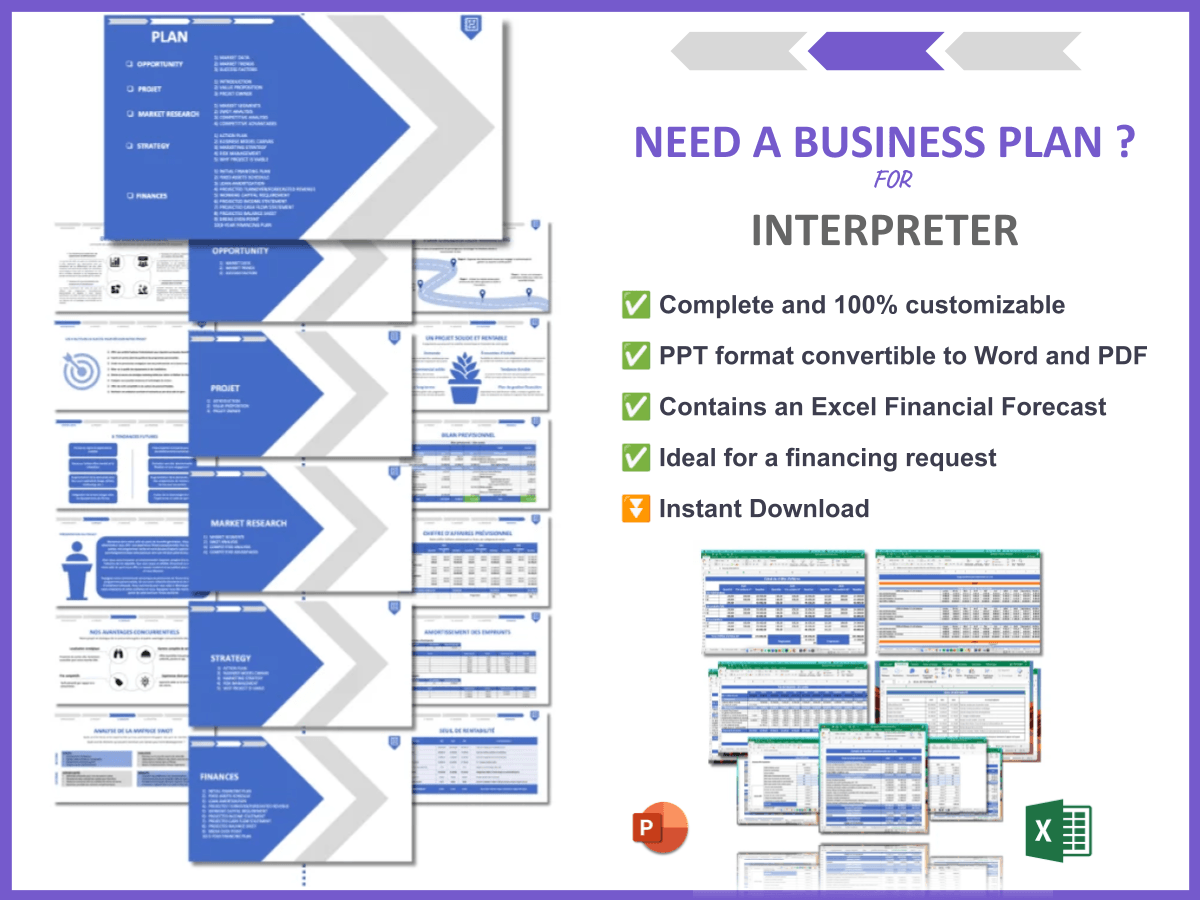How to Start an Interpreter business? You’re not alone if you’ve been contemplating this journey! With the demand for interpreters on the rise—some reports indicate a growth rate of over 20% in the field—now is a fantastic time to dive in. But what does it really take to get started?
Before jumping into the business, it’s crucial to develop and refine your business idea. Consider what niche you want to focus on, whether it’s medical, legal, or community interpreting. Reflect on your skills and experiences. What makes you stand out?
Here are a few steps to help you formulate your unique business idea:
- Identify your strengths and weaknesses: What skills do you bring to the table? Are you fluent in multiple languages? Do you have a background in specific industries?
- Analyze your interests: Consider what areas of interpreting excite you the most. Is it simultaneous interpreting for conferences, or do you prefer the one-on-one interactions of community interpreting?
- Consider potential clients: Think about the industries you want to serve. Is there a high demand for interpreters in your local area, or are there specific clients you can target?
Once you’ve developed a solid idea, it’s time to shift gears and look into the competitive landscape. Understanding the market and your competitors will help you position your business effectively.
How to Research the Market and Assess Your Competitors?
Research is key to understanding how to start an interpreter business. You need to know who your competitors are and what services they offer. This will help you identify gaps in the market.
Start by gathering information about other interpreter businesses in your area or niche. This can include:
- Website analysis
- Social media presence
- Client reviews and testimonials
To help you visualize this, here’s a simple comparison table of potential competitors:
| Competitor | Services Offered | Pricing |
|---|---|---|
| Competitor A | Medical, Legal | $50/hour |
| Competitor B | Community, Conference | $75/hour |
By analyzing your competition, you can tailor your services to better meet client needs. Additionally, consider reaching out to potential clients to understand their preferences and pain points. This will provide valuable insights that can guide your service offerings.
In conclusion, developing a unique business idea and conducting thorough market research are foundational steps in learning how to start an interpreter business. These strategies will not only set you apart from competitors but also help you identify the best opportunities for growth in the field.
How to Choose a Catchy Name for Your Interpreter Business?
Your business name is your first impression. It should be memorable and convey what you do. Think about names that reflect your services, like “Clear Voice Interpreting” or “Expert Interpreter Services.” A strong name can set the tone for your brand and help you stand out in a crowded market.
Here are some tips for choosing the right name:
- Brainstorm keywords: Start with words related to interpreting, such as “interpret,” “translate,” “voice,” or “communication.” Mix and match these words to come up with unique combinations.
- Check domain availability: In today’s digital age, having an online presence is crucial. Ensure that the name you choose has an available domain for your website.
- Get feedback: Share your top name choices with friends, family, or potential clients. Their insights can help you gauge which names resonate best.
Once you’ve settled on a name, make sure to register it to protect your brand identity!
How to Create a Detailed Business Plan for Your Interpreter Business?
Having a solid business plan is essential. It serves as your roadmap and helps you stay on track. A well-structured business plan typically includes:
- Executive Summary: A brief overview of your business and its goals.
- Market Analysis: Insights into your target market and competition.
- Marketing Strategy: How you plan to attract clients.
- Financial Projections: Estimated income, expenses, and profit margins.
I recommend checking out this business plan template for Interpreter. It’s super detailed and can save you a ton of time!
To give you a clearer picture, here’s a simple table outlining the key sections of your business plan:
| Section | Description |
|---|---|
| Executive Summary | A snapshot of your business goals and plans. |
| Market Analysis | An overview of industry trends and competition. |
| Marketing Strategy | How you will reach your target audience. |
| Financial Projections | Estimates of revenue and expenses over time. |
With a detailed business plan, you’ll be better prepared to navigate the challenges of starting your interpreter business. It also helps when seeking funding or support from investors. A clear vision often leads to greater success!
Decide on the Legal Structure for Your Interpreter Business
Your business’s legal structure affects your taxes, liability, and more. Choosing the right structure is essential for protecting your assets and ensuring compliance with laws. Common options include:
- Sole Proprietorship: This is the simplest structure, where you are the sole owner and responsible for all aspects of the business. It’s easy to set up but offers no personal liability protection.
- Limited Liability Company (LLC): An LLC provides liability protection, separating your personal assets from your business liabilities. It’s more complex to set up but offers benefits for many entrepreneurs.
- Corporation: This structure is more complex and involves more regulations, but it offers the best protection against personal liability. Corporations can also attract investors more easily.
To help you visualize the differences, here’s a table summarizing the pros and cons of each structure:
| Structure | Pros | Cons |
|---|---|---|
| Sole Proprietorship | Easy to set up, complete control | Unlimited liability, harder to raise funds |
| LLC | Limited liability, flexible management | More paperwork, potential self-employment taxes |
| Corporation | Best liability protection, easier to raise capital | Complex structure, double taxation |
Research each option thoroughly to see what fits your needs best. Consulting with a legal expert can also provide valuable insights into the most suitable structure for your interpreter business.
How to Secure Funding and Financial Resources for Your Interpreter Business?
Funding is crucial for starting any business. You need to cover initial costs such as marketing, equipment, and licenses. Here are some avenues you can explore:
- Small Business Loans: Many banks and financial institutions offer loans specifically for small businesses. Prepare a solid business plan to increase your chances of approval.
- Grants: Look for grants specifically aimed at small businesses or minority-owned businesses. These can provide non-repayable funds to help you get started.
- Crowdfunding: Platforms like Kickstarter or GoFundMe can help you raise funds from individuals who believe in your business idea. This method also helps you build a community around your services.
Additionally, creating a budget that outlines your initial expenses can help you manage your finances effectively. Consider estimating costs for:
- Marketing and advertising
- Equipment and software
- Licenses and insurance
By exploring various funding options and having a clear budget, you can set your interpreter business up for success. Remember, the right funding can make all the difference in turning your vision into reality!
How to Register Your Interpreter Business Officially?
Once you’ve decided on a name and legal structure, it’s time to register your business. This process varies by location, but generally includes several essential steps to ensure that your interpreter business is recognized by law.
Here are the typical steps you’ll need to follow:
- Choose a Business Name: Make sure your chosen name is unique and complies with your state’s naming regulations. Check for existing businesses to avoid conflicts.
- File the Necessary Paperwork: Depending on your legal structure, you may need to file articles of incorporation or organization with your state’s Secretary of State.
- Obtain a Business License: Most local governments require a business license. Check with your city or county clerk’s office for requirements.
- Register for State Taxes: If applicable, register for state taxes and obtain any necessary permits.
Make sure to keep copies of all documentation for your records. It’s essential to stay organized, as you’ll need these documents for various purposes, such as applying for loans or filing taxes.
How to Obtain Necessary Tax Identification Numbers, Licenses, and Permits?
Getting the right tax identification numbers, licenses, and permits is crucial for running your interpreter business legally. Here’s a breakdown of what you may need:
- Employer Identification Number (EIN): This is a unique number assigned by the IRS for tax purposes. You can apply for an EIN online for free, and it’s necessary if you plan to hire employees.
- State-Specific Business Licenses: Depending on your state and local regulations, you may need specific licenses to operate as an interpreter. Research the requirements in your area.
- Permits Based on Your Services: If you’re providing specialized interpreting services (like legal or medical), you might need additional certifications or permits to comply with industry standards.
It’s important to stay informed about local regulations and ensure that you have all the necessary licenses and permits before starting your business. This will help you avoid legal issues down the road and establish credibility with your clients.
By taking these steps to register your business and obtain the necessary documentation, you’ll be laying a solid foundation for your interpreter business to thrive.
How to Apply for Business Insurance Coverage for Your Interpreter Business
Insurance protects you from unforeseen circumstances that could impact your interpreter business. As a service provider, you may face various risks, so having the right coverage is essential. Here’s what you need to know:
- General Liability Insurance: This type of insurance covers claims related to bodily injury, property damage, and personal injury. It’s crucial for protecting your business from lawsuits.
- Professional Liability Insurance: Also known as errors and omissions insurance, this protects you from claims that may arise from mistakes or negligence in your interpreting services.
- Business Property Insurance: If you have a physical office or equipment, this insurance covers damage to your property due to theft, fire, or other disasters.
To help you understand the different types of coverage available, here’s a table summarizing the key insurance options:
| Insurance Type | Coverage | Importance |
|---|---|---|
| General Liability | Bodily injury and property damage | Protects against lawsuits |
| Professional Liability | Negligence and errors in services | Covers legal fees and settlements |
| Business Property | Damage to office and equipment | Safeguards your assets |
When applying for insurance, it’s wise to shop around and compare quotes from different providers. Consulting with an insurance agent can also help you find the right coverage tailored to your needs.
How to Set Up Your Financial Management Systems for Your Interpreter Business?
Keeping track of your finances is crucial for any business, including an interpreter business. A solid financial management system will help you monitor your income, expenses, and cash flow effectively. Here are some steps to consider:
- Choose Accounting Software: Utilize accounting software like QuickBooks or FreshBooks to help you manage your finances. These tools can automate invoicing, expense tracking, and financial reporting.
- Set Up a Business Bank Account: Keeping your personal and business finances separate is essential for organization and tax purposes. Open a dedicated business bank account to manage your funds.
- Track Income and Expenses: Regularly review your financial statements to understand where your money is coming from and where it’s going. This practice will help you make informed decisions.
Consider creating a simple budget that outlines your expected income and expenses. This will help you stay on track and avoid overspending. You might also want to consult with a financial advisor for personalized guidance.
By implementing a solid financial management system, you’ll be better prepared to handle the financial aspects of your interpreter business, ensuring its long-term success.
How to Establish Your Brand Identity as an Interpreter?
Your brand is how clients perceive you, and establishing a strong brand identity is vital for your interpreter business. A well-defined brand can help you attract clients and differentiate yourself from competitors. Here’s how to create a compelling brand identity:
- Create a Logo: A professional logo is a visual representation of your brand. It should be simple yet memorable, conveying the essence of your interpreting services.
- Choose Your Brand Colors: Colors evoke emotions and can influence how clients perceive your business. Select a color palette that reflects your brand’s personality—calm blues for professionalism, or vibrant colors for creativity.
- Develop a Tagline: A catchy tagline summarizes what you do and what makes you unique. Make it concise and relevant to your services.
Additionally, consistency is key. Ensure that your branding elements are used consistently across all platforms, from your website to your business cards. This creates a cohesive image that clients will recognize.
To give you a clearer picture, here’s a simple table outlining essential elements of your brand identity:
| Element | Description |
|---|---|
| Logo | A visual representation of your brand |
| Color Palette | Colors that reflect your brand’s personality |
| Tagline | A concise summary of your services |
How to Develop a Professional Website for Your Interpreter Business?
A website is your online portfolio and a crucial tool for attracting clients. It should effectively showcase your services and provide essential information. Here’s how to create a professional website:
- Choose a User-Friendly Platform: Platforms like WordPress, Wix, or Squarespace offer easy-to-use templates for building your website.
- Include Key Information: Your website should feature information about your services, rates, testimonials, and contact details. Make it easy for potential clients to reach out.
- Optimize for SEO: Use relevant keywords, such as interpreter services and language interpretation, throughout your website to improve visibility on search engines.
Additionally, consider including a blog where you can share insights, tips, and industry news. This not only positions you as an expert but also improves your website’s SEO.
How to Market and Advertise Your Interpreter Business?
Marketing is essential for attracting clients to your interpreter business. You need to create a strategy that effectively promotes your services. Here are some methods to consider:
- Utilize Social Media: Platforms like LinkedIn, Facebook, and Instagram can help you connect with potential clients. Share your experiences, success stories, and tips related to interpreting.
- Network with Industry Professionals: Attend conferences, workshops, and local events to meet potential clients and other professionals in the field.
- Invest in Online Advertising: Consider using Google Ads or social media advertising to target specific demographics and reach potential clients.
Additionally, creating valuable content that showcases your expertise can attract clients. Whether it’s blog posts, videos, or webinars, providing useful information can establish trust and credibility.
How to Assemble Your Team for Your Interpreter Business?
As your interpreter business grows, you may need to expand your team. Building a strong team can enhance your services and allow you to take on more clients. Here’s how to do it:
- Identify Your Needs: Determine what roles you need to fill. This could include additional interpreters, administrative support, or marketing personnel.
- Recruit Qualified Professionals: Look for individuals with the necessary skills and experience. Use job boards, networking events, and social media to find potential candidates.
- Provide Training and Support: Once you’ve assembled your team, invest in their training and development. This ensures everyone is on the same page and understands your business values and standards.
By carefully assembling a team, you can enhance your interpreter business capabilities and provide even better service to your clients.
Conclusion
Starting an interpreter business can be a rewarding venture, especially as the demand for interpreting services continues to grow. By following the steps outlined in this guide—from refining your business idea to marketing your services—you’ll be well-equipped to establish a successful business. Remember, the key to success lies in thorough planning, understanding your market, and continually adapting to the needs of your clients.
For further insights, I encourage you to explore our articles on how to create a SWOT Analysis for Interpreter and how to plan an Interpreter Marketing Strategy with examples. These resources will provide you with additional tools to navigate the complexities of the interpreting industry.
FAQ
- What qualifications do I need to start an interpreter business? Most interpreters require proficiency in at least two languages and may benefit from formal training or certifications in interpreting.
- How much can I charge as an interpreter? Rates vary based on experience, specialization, and location. On average, interpreters can charge anywhere from $25 to $150 per hour.
- Do I need a business license to operate as an interpreter? Yes, obtaining a business license is typically required to operate legally in your area. Check local regulations for specific requirements.
- How can I market my interpreter services? Utilize social media, attend networking events, and create a professional website to showcase your services and attract clients.
- What types of interpreting services can I offer? You can offer various services, including medical, legal, conference, and community interpreting, depending on your expertise.
- Is it necessary to have insurance as an interpreter? While not legally required, having professional liability insurance is highly recommended to protect against potential claims.
- How do I find clients for my interpreter business? Networking, joining professional organizations, and utilizing online platforms can help you connect with potential clients.
- Can I work as a freelance interpreter? Yes, many interpreters work as freelancers, providing flexibility and the ability to set their own rates and hours.
- What tools do I need to be a successful interpreter? Essential tools may include a reliable computer, high-speed internet, specialized software for remote interpreting, and a quiet workspace.
- How do I stay updated with industry trends? Joining professional associations, attending conferences, and participating in workshops can help you stay informed about the latest trends and best practices in interpreting.







